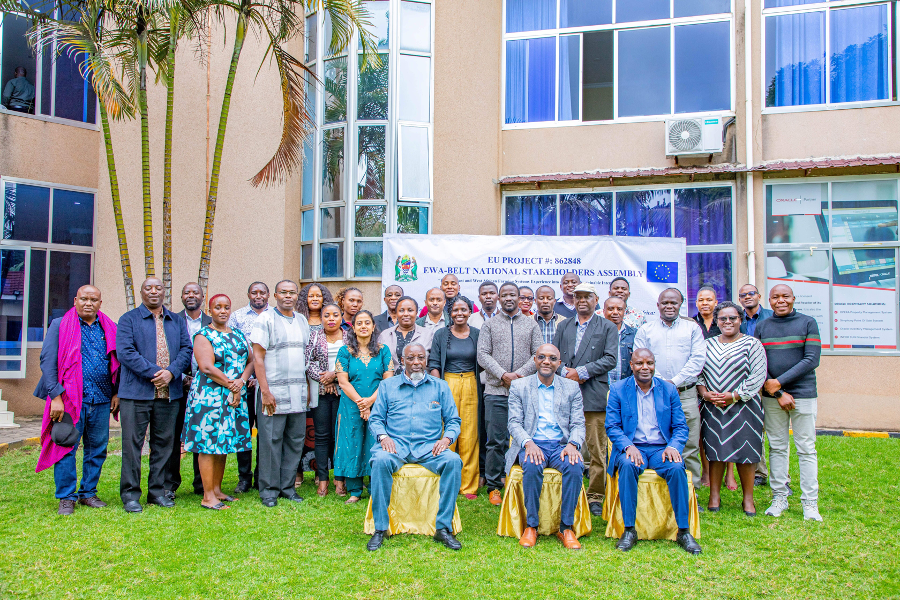Melchiade Bukuru, Former Director UNCCD Liaison Office in New York, chair of the EWABELT session at the 23rd Infopoverty World Conference
- OCCAM - Observatory on Digital Communication

- May 9, 2024
- 3 min read
Updated: May 24, 2024
The chair of the EWABELT Session at the 23rd Infopoverty World Conference attests to how "Poverty and hunger have the same geography: the poorest and the hungriest are essentially located in areas where land, the domain asset of the poor, is degraded".
Watch the statements by the speakers on our "SI in Africa" Joint YouTube channel

According to the World Food Program (WFP), as many as 828 million people were affected by hunger in 2021 - a 22% increase from 2019 driven largely by the COVID-19 pandemic. On top of this, in most countries, malnutrition is highest among the poorest 20% of residents. The WFP projects that, by 2030, nearly 670 million people (8% of the global population) will still be hungry.
Both hunger and poverty are, in many cases, intergenerational. Many of the poverty-related causes of malnutrition, such as food insecurity or poor access to health services, endure for multiple generations of the same family or community, exacerbated also by climate change, conflict and forced migration.
All of these situations usually boil down to three key issues:
Poor or no access to a quality diet - can people find anything to eat?
Lack of knowledge, skills and support to ensure optimal care for women and children especially - when it comes to health and nutrition, how can we educate and train people to reach enough food-security levels?
Poor or no access to water, sanitation and essential health services.
If poverty is a combination between inequality and risk, then hunger creates vulnerability. This in turn feeds into the risks that fuels poverty. In this context, what are the advantages that digital innovations and AI bring into the picture?
This was exactly the point made by the chair of the second session of the 23rd Infopoverty World Conference dedicated to the EWABELT Project (GA 862848) on the theme “Poverty eradication and hunger: a first challenging priority for AI” on April 12, 2024, at the United Nations Headquarters in New York, Mr Melchiade Bukuru, Former Director of UNCCD Liaison Office in New York.
Read below his statement for a complete overview.
"Thank you and good afternoon. President Saporito and colleagues thank you for perpetuating this tradition of convening an annual Infopoverty World Conference. I’m happy also to be part of this tradition for a decade and for the opportunity provided to me to chair this important session. My name is Melchiade Bukuru, I’m freshly retired from the UN public service and I’m proud to remain in full shape to pursue this kind of diplomatic and international activities.
Poverty and hunger have the same geography, the poorest and the hungriest are essentially located in areas where land, the domain asset of the poor, is degraded. Poverty and hunger also have a gender. In rural areas where land is degraded women bear the brunt of desertification, land degradation and drought. This is the place to invest, this is the place where safe, secure and trustworthy artificial intelligence will be tested to positively impact livelihoods. I would like now to convene the session of our agenda to discuss the first challenging priority for artificial intelligence as regards to poverty and the eradication of hunger. I’m happy that our discussion takes place after the general assembly has set the tone and the boundaries of artificial intelligence in the recent resolution titled seizing the Opportunities of safe, secure and Trustworthy AI systems for sustainable development.
-Mr Melchiade Bukuru,
UNCCD Liaison Office Former Director
Drawing from the insights emerged from the statements of the participants - stay tuned for more! - OCCAM drafted the Final declaration of the Conference, which includes suggestions, proposals and recommendations at all levels to cope with an ever-changing world where technologies, if adequately oriented and regulated, could be beneficial to a global socio-economic development in view of e-welfare for all, in the respect of human rights and UN principles.
Alongside it, OCCAM outlined the Plan of Action that encompasses all the operative instances that emerged towards the achievement of the SDGs and the UN 2030 Agenda, dedicating particular attention to the best practices of the EWABELT Project and promoting scientific and policy recommendations for the benefit of the most disadvantaged communities, especially in sub-Saharan Africa.
**
For media inquiries, please contact:
OCCAM - Observatory on Digital Communication





Comments